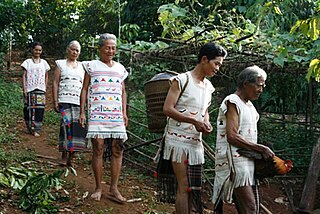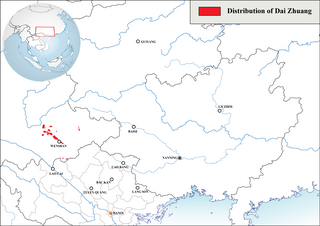The Sán Dìu are a Yao ethnic group in northern Vietnam who speak Yue Chinese (Cantonese), a Sinitic language. They are believed to have migrated from Guangdong, China around 1600.

The fifteen Katuic languages form a branch of the Austroasiatic languages spoken by about 1.3 million people in Southeast Asia. People who speak Katuic languages are called the Katuic peoples. Paul Sidwell is the leading specialist on the Katuic languages. He notes that Austroasiatic/Mon–Khmer languages are lexically more similar to Katuic and Bahnaric the closer they are geographically. He says this geographic similarity is independent of which branch of the family each language belongs to. He also says Katuic and Bahnaric do not have any shared innovations, so they do not form a single branch of the Austroasiatic family, but form separate branches.

The Thổ ethnic group inhabits the mountainous regions of northern Vietnam, mainly Nghệ An Province southwest of Hanoi. Many Thổ speak the Tho language, which is closely related to Vietnamese. The Thổ population numbered 91,430 in 2019.

Halang, also known as Salang, is a Bahnaric language of the Mon–Khmer branch of the Austroasiatic language family. It is spoken in the southern Laotian province of Attapu by approximately 4,000 people and in the neighboring Kon Tum Province of Vietnam by approximately 13,000 people. In Vietnam, Halang is spoken in Đắk Na Commune, Đắk Tô District, Kon Tum Province

The Mnong language belongs to the Austro-Asiatic language family. It is spoken by the different groups of Mnong in Vietnam and a Pnong group in Cambodia.

The Mạ or Maa are a Mon–Khmer indigenous people of Vietnam. They are concentrated mostly in the Lâm Đồng and Đồng Nai province of the country, particularly in the area of the upper Đồng Nai River. They are very close to the Koho people.

Nguồn is a Vietic language spoken by the Nguồn people in the Trường Sơn mountains in Vietnam's North Central Coast region as well as in nearby regions of Laos.
Laghuu is a Loloish language spoken in northwestern Vietnam. In Nậm Sài, Sa Pa Town, the speakers' autonym is, while in Sơn La Province it is . The people are also called the Phù Lá Lão by the Vietnamese.
Bruu is a Mon–Khmer dialect continuum spoken by the Bru people of mainland Southeast Asia.

Phạm Xuân Nguyên, better known by his pen name Ngân Xuyên, is a Vietnamese writer and literary translator.

Dai Zhuang or Thu Lao is a Tai language spoken in Yunnan, China and northern Vietnam. In China is it spoken in Yanshan, Wenshan, Maguan, Malipo, Guangnan counties of Wenshan Prefecture. It is also spoken in Honghe Prefecture. The largest concentrations are in Wenshan and Yanshan counties.

Todrah is an Austroasiatic language of Vietnam. The two dialects, Sodrah and Xodrah, are quite distinct. Speakers are officially classified by the Vietnamese government as Sedang people.

Monom (Monam), not to be confused with Bonam, is an Austro-Asiatic language of Vietnam. Speakers are officially classified by the Vietnamese government as Sedang people.

Pa Di is a Southwestern Tai language of the Chinese–Vietnamese border. There are about 300 Pa Di speakers in Muong Khuong District, Lao Cai Province, Vietnam, who are classified as ethnic Tày by the Vietnamese government. Pa Di tonal splits are similar to those of Standard Thai.
Quảng Lâm is an unclassified, poorly attested Austroasiatic language spoken in Quảng Lâm commune, Mường Nhé District, Điện Biên Province, northwestern Vietnam. Nguyễn Văn Huy (1975) is the only published resource contain data of Quang Lam. The Ethnologue lists Quang Lam as an alternate name for Kháng.
Nguyễn Văn Lợi was a Vietnamese linguist who served as the deputy director of the Institute of Linguistics at the Vietnam Academy of Social Sciences.

The 2nd Central Committee of the Workers' Party of Vietnam (WPV) was elected at the 2nd WPV National Congress. It elected the 2nd Politburo and the 2nd Secretariat.












